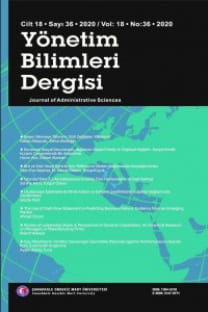Women in Academia in Turkey: Challenges and Opportunities
Türkiye'de Akademide Kadınlar: Zorluklar ve Fırsatlar
___
- Acar, Feride. Women and University Education in Turkey, Higher Education in Europe,1993, 18(4), 65-77.
- Acar, Feride. Women's University Faculty of Turkey', Ayşe Berktay Hacımirzaoğlu (eds.), 75 Türkiye Üniversitelerinde Kadın Öğretim Üyeleri, Istanbul: Foundation Publications, s. 313- 321.
- Acar, Feride. Türkiye'de Kadin Akademisyenler: Tarihsel Evrim ve Bugünki Durum'. Akademik Yasamda Kadın: Frauen in der akademischen Welt, Hasan Coskun (eds.), Turkish-German Cultural Affairs, s. 75-87.
- Acar, Feride; Ayata, Ayşe Güneş; Varoğlu, Demet. Gender -Based Discrimination: The Case of Education Sector in Turkey. Ankara: Prime Ministry General Directorate T. C. Satatü and Problems of Women, 1999.
- Chan, Anita K. Gender, School Management and Educational Reforms: A Case Study of a Primary School in Hong Kong, Gender Education 16, 2004, s. 491-510.
- Donovan, Clair; Hodgson, Barbara; Scanlon, Eileen; Whitelegg, Elizabeth. Women in Higher Education: Issues and Challenges for Part-Time Scientists', Women's Studies Intl. Forum 28, 2005, s. 247-258.
- Ecevit, Yıldız. Çalışma Yaşamında Kadın Emeğinin Kullanımı ve Kadın - Erkek Eşitliği, Kadın -Erkek Eşitliğine Doğru Yürüyüş: Eğitim, Çalışma Yaşamı ve Siyaset, (İstanbul: TUSIAD, 2000).
- Healy, Geraldine; Özbilgin, Mustafa; Aliefendioğlu, Hanife. Academic Employment and Gender: A Turkish Challenge to Vertical Segregation, European Journal of Industrial Relations, 11 (2), 2005, s. 247-264.
- Köker, Eser. Turkiye'de Kadın, Eğitim ve Siyaset: Yukseköğrenim Kurumlarında Kadının Durumu Üzerine Bir İnceleme (Basılmamış Doktora Tezi, Ankara University, 1988).
- Neusel,Ayla; Bradatsch, Christiane; Gülşen, Yalçın. The Higher Education System as a Factor Determining the Scientific Career of Women', Women in Academic Life 9, 1996, s. 366 - 393.
- Öncü, Ayşe. Turkish Women at Professional Professions, Nermin Abadan-Unat, (eds.) içinde Women in the Turkish Society, (Ankara: Sosyal Bilimler Dernegi Yayını, 1978).
- Özbay, Ferhunde. Kadınlarin Ev ici ve Ev dışı Uğraşlarıındaki Değişme, Şirin Tekeli (eds.) 1980'ler Türkiyesinde Kadın Bakış Açısından Kadınlar (Istanbul: İletişim Yayınları, 1993).
- Özbilgin, Mustafa. A Cross-Cultural Comparative Analysis of Sex Equality in the Financial Services Sector in Turkey and Britain. (Doktora Tezi, University of Bristol, 1998).
- Özbilgin, Mustafa; Healey, Geraldine. The Gendered Nature of Career Development of University Professors: The Case of Turkey, Journal of Vocational Behavior, 64(2), 2004, s. 358-371.
- Özel,Ali. The Status of the Female Academicians in Turkish Universities During the Process of EU Admission, Journal of Applied Sciences, 7, 2007, s. 3678-3686.
- Özkanlı, Özlem; Korkmaz, Adil. Academic Women in Turkey: The Structure of Attitudes Towards Role Conflict (The Global Awareness Society International Ninth Annual International Conference Proceedings Book, New York, ABD, May 2000).
- Özgüç, Nazmiye. Kadınların Coğrafyası (İstanbul: Çantay Kitabevi, 1998).
- Palaz, Serap. Gender Segregation in the Turkish Institutes of Higher Education Employment. (The International Association for Feminist Economics 2000 Conference, August, Istanbul: Boğaziçi University, 1999)
- Peker, Resat M. Internal Migration and the Marginal Sector. Eser Kahveci, Nadir Sugur and Theo Nichols, Work and Occupation in Modern Turkey (eds.), (London: Mansell, 1996).
- Perna, Laura W. The Benefits of Higher Education: Sex, Racial/Ethnic and Socioeconomic Group, Review on Higher Education 29, 2005, s. 23-52.
- OECD (2015), accessed on 18 July 2016 and retrieved from http://www.oecd.org/ edu/education-at-a-glance-19991487.htm Ourliac, Guy. The Feminisation of Higher Education in France: Its History, Characteristics and Effects on Employment, European Journal of Education 23, 1988, s. 281-292.
- Republic of Turkey Higher Education Council Student Selection and Placement Center, 2014. The numbers of lecturers at high education programs at graduate level according to their field.
- Republic of Turkey Higher Education Council Student Selection and Placement Center, 2015. The numbers of the lecturers with respect to their academic status.
- Reskin, Barbara F.; Roos, Patricia A. Job Queues, Gender Queues: Explaining Women's Inroads into Male Occupations, (Philadelphia: Temple University Press, 1990).
- Sandler, Bernice. Women in higher education, What Constitutes Equity? (Paper Presented at the 27th National Conference on Higher Education, 1972).
- She Figures, 2012. Retrieved from: http://data.europa.eu/euodp/sv/data/dataset/ she-figures-2013-gender-in-research-and-innovation, accessed on 18 July 2016.
- Tan, Mine. Bir Kadın Mesleği: Öğretmenlik, Necla Arat (eds.), Kadın Gerçeklikleri, İstanbul: Say Yayınları.
- The Council of Higher Education, 2006. Retrieved from http://siteresources.worldbank.org/EXTECAREGTOPEDUCATION/Resources/444607-1192636551820/ Turkey_Higher_Education_Paper_062907.pdf , accessed on 18 July 2016.
- The Council of Higher Education, 2014. Retrieved from http://www.yok.gov.tr/ documents/10348274/10733291/TR'de+Yükseköğretim+Sistemi2.pdf/9027552a- 962f-4b03-8450-3d1ff8d56ccc, accessed on 18 July 2016.
- Tokol, Aysen. Women Workforce of the World, (Tebliğ, Proceeding of Women Workforce of Turkey-I, Ankara, 1999), s.19-27.
- TUIK, 'Istatistiklerle Kadin', 2016. Retrieved from: http://www.tuik.gov.tr/PdfGetir.do?id=18619
- ISSN: 1304-5318
- Yayın Aralığı: 4
- Başlangıç: 2003
- Yayıncı: Yönetim Bilimleri Dergisi
Bankacılık Sektöründe Algılanan Hizmet Kalitesinin Müşteri Memnuniyeti Üzerine Etkisi
Mustafa KARADENİZ, Mustafa GÖZÜYUKARI
Kopenhag Siyasi Kriterlerinin Türkiye’nin Ulusal Güvenliğine Yansımaları
Enerji Verimliliğinin Sürdürülebilir Kalkınmadaki Rolü: Türkiye Değerlendirmesi
Türkiye’de Farklı Gelir Grupları Açısından Lüks Algısının İncelenmesi
M. Murat YAŞLIOĞLU, Emrah ÖNDER
